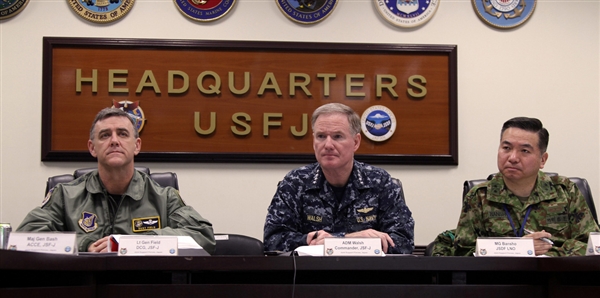SEYMOUR-JOHNSON AIR FORCE BASE, N.C., May 6, 2011 — The killing of Osama bin Laden “could be a game changer” that affects the situation in Afghanistan, Defense Secretary Robert M. Gates said here today.
Still, it will take time before the situation clarifies, Gates told about 450 airmen at the 335th and 336th Fighter Squadrons.
“Bin Laden and [Taliban leader] Mullah Omar had a very close personal relationship, and there are others in the Taliban who have felt betrayed by al-Qaida — [they feel] it was because of al-Qaida’s attack on the United States that the Taliban got thrown out of Afghanistan,” the secretary said. “We’ll have to see what that relationship looks like.” Officials may know in six months or so how bin Laden’s death has affected al-Qaida operations in Afghanistan and elsewhere, Gates said.
The secretary described U.S. relations in the region as complex. Using Pakistan as an example, the secretary said he would have been astounded if someone had told him two years ago that Pakistan would have 140,000 troops on its western border with Afghanistan and was going to drive the Pakistani Taliban and al-Qaida from South Waziristan and the Swat Valley. “I would have said that’s not going to happen, but it has,” he said.
Pakistan has pulled troops from its border with India and has taken thousands of casualties in the fight against the terrorists. Pakistan also allows a huge percentage of the logistics sent to troops in Afghanistan to flow across their country, Gates said.
The United States and Pakistan are firm partners in the fight against terrorism, Gates said. However, he added, the Pakistanis may be concerned that United States’ current interest in the region may diminish with time.
“At the same time there is no question that they hedge their bets,” he said of Pakistan’s leadership. “Their view is that we have abandoned them four times in the last 45 years, and they are still not sure we are going to stay in the region. They saw us leave after the Soviets were thrown out of Afghanistan in 1989 and they are not confident that we won’t leave again when we have accomplished our mission in Afghanistan.”
Pakistan and the United States have to keep working on their relationship, Gates said. At the tactical level — across the border with Afghanistan — the relationship is good and getting better, he said. U.S. and Pakistani forces take turns being the “hammer and anvil” with the Taliban stuck in the middle.
“I would say it is a relationship we just have to keep working at,” he said.
Source:
U.S. Department of Defense
Office of the Assistant Secretary of Defense (Public Affairs)

 von
von 